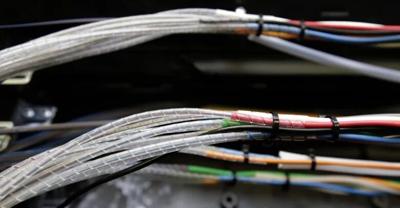charleston – Fifteen years ago, Verizon handed over its network of wired internet and phone lines to Frontier Communications in West Virginia.
Now, the company wants it back.
If Verizon’s deal to acquire the original network and its expansion is approved by state regulators, it would make the telecommunications giant the largest internet and phone provider in the state.
Since October, the West Virginia Public Service Commission had been waiting for details about how Verizon intended to address years of poor phone service and slow internet speed complaints from Frontier customers.
Verizon officials have been negotiating more specific details with broadband and labor union representatives and submitted detailed plans to the PSC early Friday.
They say they plan to improve upon Frontier’s customer service, expand broadband and submit annual plans to regulators. They also pledged to invest in the state’s workforce.
Here’s everything you need to know about the deal, why it’s happening now, and what it could mean for Frontier customers and West Virginia’s broadband expansion.
Why is Verizon acquiring Frontier?
Last September, Verizon announced a $20 billion deal to acquire Frontier’s operations nationwide.
Frontier currently serves over 150,000 homes and businesses in the state with fiber broadband, according to Verizon’s application to PSC regulators.
“The acquisition of Frontier is a strategic fit,” said Hans Vestberg, Verizon’s CEO. “It will build on Verizon’s two decades of leadership at the forefront of fiber… enhancing our ability to deliver premium offerings to millions more customers across a combined fiber network.”
The deal has already passed federal hurdles.
Last month, the deal was approved by regulators at the Federal Communications Commission after Verizon committed to end its diversity, equity and inclusion programs.
However, because West Virginia regulates its own utilities and telecommunications providers, the deal requires approval from state regulators.
“My main concern about this whole transaction is the quality of service that our landline customers, who have no alternative, are going to see,” said PSC Chairman Charlotte Lane.
What is Frontier’s history in West Virginia?
Frontier hasn’t had the best track record in West Virginia.
The company took over Verizon’s telecommunications lines in 2010, and quickly became the state’s largest and most complained-about provider.
Over the years, customers have filed thousands of complaints and even sued the company over slow internet speeds and unreliable phone service.
Between 2010 and 2023, Frontier received over 13,000 informal complaints and over 500 formal complaints from customers, according to PSC filings. And in 2020, the company filed for bankruptcy, citing billions of dollars of debt and infrastructure issues.
That same year, Frontier settled with state regulators and pledged to invest $200 million in West Virginia to upgrade its infrastructure and improve services over the next three years.
Despite the company’s commitments, complaints continued to flood in, reaching a peak of nearly 1,400 in 2022. Frontier’s debt has surged to $12 billion, according to filed testimony.
How is Verizon planning to address issues?
Verizon has claimed customers should expect “improved service quality and reliability,” and plans to build on Frontier’s existing fiber infrastructure.
Some of the company’s offerings will include bundle options for internet and phone service, and a new $20 per month broadband plan for low-income households in the state, according to PSC filings.
After negotiations with union representatives and state broadband officials, the company announced more specific plans for customer service improvements and broadband expansion Friday afternoon.
To address some customer service issues, Verizon committed to answer at least 80% of its service calls within 30 seconds and to hire 25 new technicians.
Verizon also plans to complete an audit of Frontier’s broadband infrastructure and connect at least 35,000 new addresses with high-speed internet. The company will invest $30 million to support other broadband projects in the state.
That agreement will now go back to the PSC for consideration.
What should current Frontier customers expect?
If the deal goes through, customers won’t see a big difference in the short term, said Ted Nugent, vice president of consumer sales and services for Verizon.
“On day one, our expectation is that there will be no change,” he said. “We do not want to disrupt service for any customers for any of the services available today.”
Ultimately, if the PSC approves the deal, Verizon will assume ownership of Frontier’s network and customer accounts, and the companies will need time to shift personnel and services.
The company hasn’t released any information about whether service costs will increase for new customers.
For now, Frontier customers should monitor their services and check important updates to billing plans and accounts.

















Commented
Sorry, there are no recent results for popular commented articles.